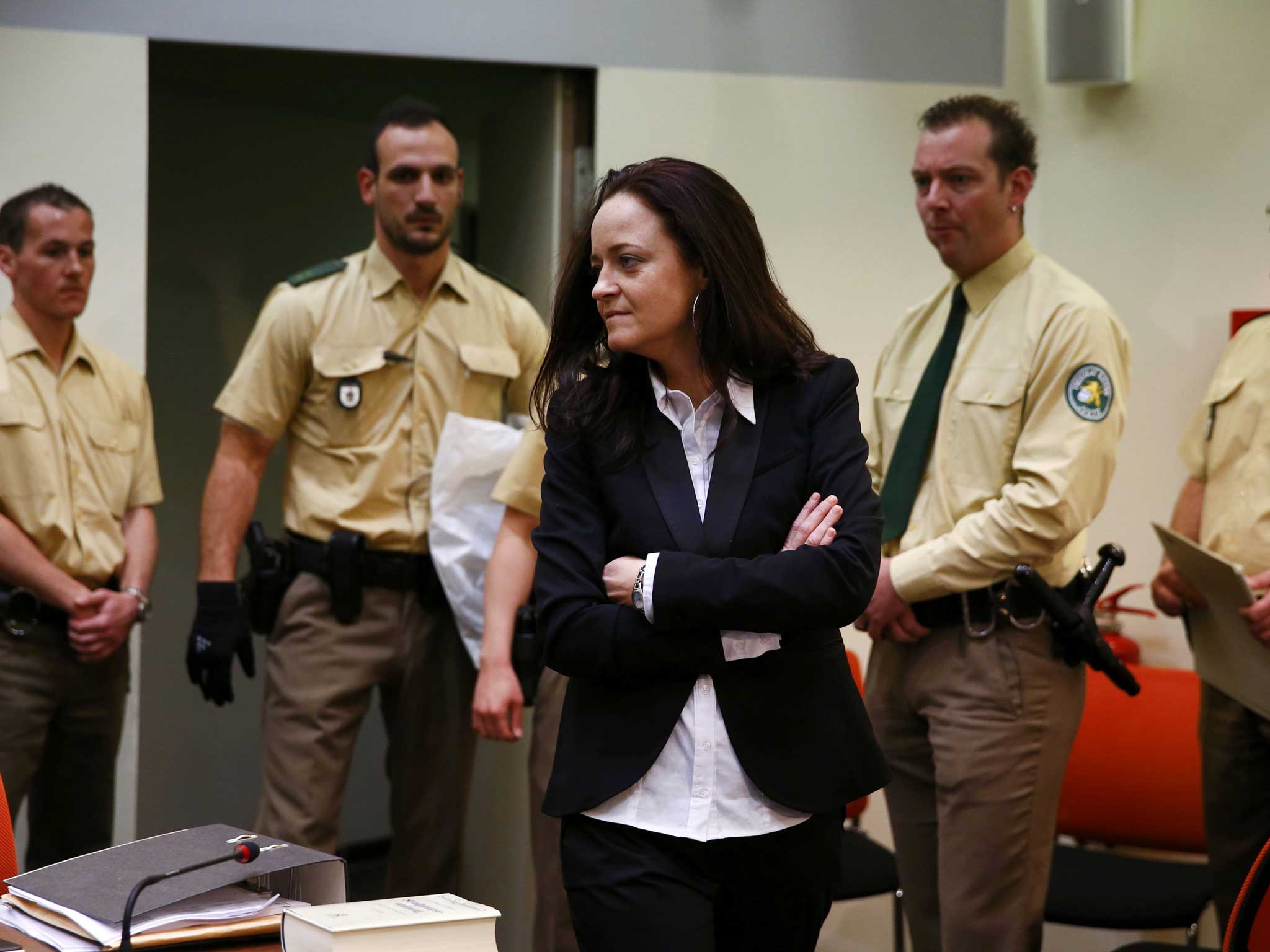Beate Zschäpe trial over Germany's worst neo-Nazi violence since World War II opens in Munich
Authorities also under scrutiny, after repeated failure to link the killings and find racist motive

She is billed as the face of Germany’s murderous far-right. But Beate Zschäpe - the 38-year-old gardener charged with the country’s worst racist killings in six decades - looked more like a clean-cut professional than a neo-Nazi monster as she walked into Munich’s heavily guarded criminal court.
Dressed in a black suit, white blouse and wearing large circular earrings, Zschäpe threw back a long mane of dark chestnut hair. Her lawyers said she had used up the last of her prison pocket money to dye her greying tresses a suitable colour for her court marathon.
But her ashen complexion betrayed the strain Zschäpe is now under as she and four other alleged far-right accomplices, some with racist slogans tattooed on their bodies, faced trial for the first time -18 months after their arrest - in Germany’s biggest neo-Nazi case since World War II.
As anti-racist and Turkish protesters outside the court clashed with police during a demonstration calling for the authorities to root out neo-Nazi violence, Zschäpe turned her back on the television cameras inside. She threw only a brief glance at the lawyers representing the families of the mainly Turkish victims she is alleged to have helped murder, who were sitting only a few feet away to her right.
Her lawyers said she would remain silent for the duration of her trial, which is expected to last until well into next year. Mehmut Tanan, a lawyer who was attending the trial as an official Turkish observer told The Independent that he wanted to see Zschäpe “imprisoned for life.”
Zschäpe is the only surviving member of Germany’s National Socialist Underground (NSU), a three person far-right cell which is accused of murdering nine immigrant small shopkeepers - eight Turks and one Greek - and a policewoman. They are also accused of being behind two devastating nail bomb attacks during a killing spree which lasted from 2000 until 2007.
Some of the relatives raised their hands to their mouths in horror as Zschäpe walked in to the court room yesterday. Seriya Simsek, whose Turkish shopkeeper father Enver was the first to be murdered, said: “The only thing this woman can do is to try and help us understand why. Were they not aware that there was a family behind each one of their victims?”
All of the NSU’s alleged victims were shot dead at point blank range in the head and without warning. The nail bomb attacks carried out in Cologne’s immigrant quarter caused appalling injuries from which many of the victims will never recover. State prosecutors say the NSU’s aim was to terrorise Germany’s immigrants into leaving the country.
The murders and bomb attacks have caused outrage in Germany not least because they remained unsolved for over a decade. Police and the intelligence services have been bitterly criticised for turning a blind eye to far-right crime. For years the police suspected that an immigrant “Mafia” was behind the killings.
“We want the mistakes of the authorities to be an issue in this trial,” insisted Reinhard Schoner, a lawyer for the relatives of the victims insisted yesterday.
The NSU was only identified as the group behind the murders in November 2011. But by that time Zschäpe’s fellow “comrades”, far-right fanatics Uwe Mundlos, 38, and Uwe Bönhardt, 34, had committed suicide in a caravan from which they carried out a botched bank robbery in the east German town of Eisenach. The murder weapon, a Ceska pistol fitted with a silencer, was found among the remains.
Zschäpe, a trained gardener who was rejected by her mother and raised by her grandparents, met up with Mundlos and Bönhardt in east Germany in the late 1990s. She took both men as lovers, reportedly taking their xenophobic views on board.
The group went underground in 1998 and she is alleged to have acted as their fixer, cooking for them, arranging accommodation, supplying false documents and playing the role of friendly neighbour to allay suspicions. While her two comrades went out and killed, she is alleged to have watched online pornography.
Realising her number was up, Zschäpe set fire to the upstairs flat she shared with the killers in an attempt to destroy evidence and went on the run. Four days later she turned herself in to police.
Soon after the trial opened yesterday, Manfred Götzl, the presiding judge, faced allegations of bias from Zschäpe’s defence lawyers. They complained that unlike the prosecution lawyers they were being searched for weapons by court guards. The court has postponed a decision on their submission. The trial continues.
Join our commenting forum
Join thought-provoking conversations, follow other Independent readers and see their replies
Comments
Bookmark popover
Removed from bookmarks